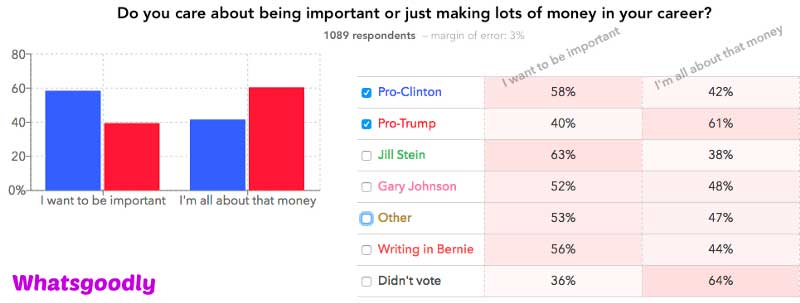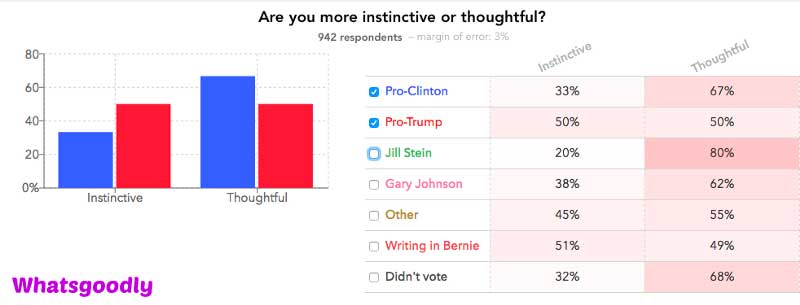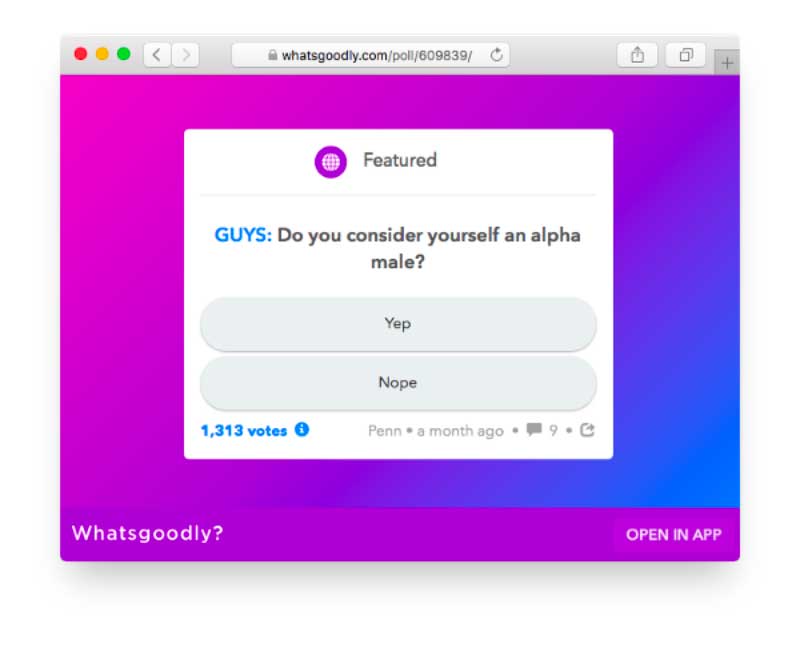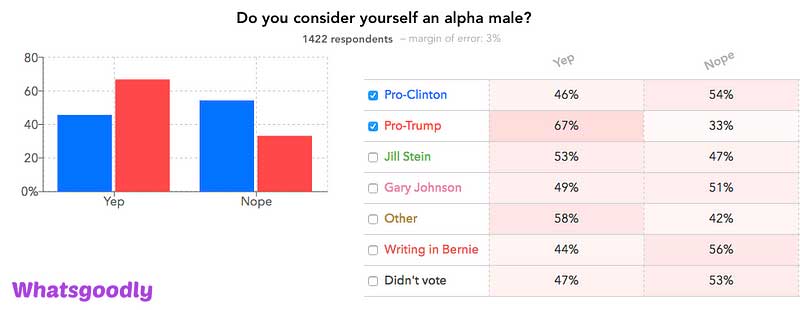
What happened when we sorted our polls by how differently Trump supporters voted?
We see thousands of student polls every week on Whatsgoodly covering topics from politics to dating to college life. So one day, we asked ourselves an obviously political question: What happens if we sort our personality polls by how much Trump supporters differ from Clinton supporters?
Before the 2016 presidential election, we created the Winsights Library to make this task as easy as possible. We reorganized our 800,000 polls, tracking how Trump supporters and Clinton supporters differ on everything from pineapple pizza and Jurassic Park to dating and sex. Today, we checked the results. Here are the three most significant trends we found:
#3: Trump Supporters Value Making Money Over Feeling Important
We analyzed a poll asking millennials if they care more about “being important” or “making money.” Out of 1,089 respondents, 55% voted for money, and 45% voted for importance. This contrasts with common speculation that millennials work more for purpose than for money, but it may also be a false dichotomy: according to Fidelity’s online sample of 1,500, work/life balance and company culture are turning millennials’ heads more than paychecks.
Either way, an interesting thing happens when you break down the results by presidential candidate preference:

Clinton voters were much more likely than Trump voters to choose importance over money, by a difference of almost 20%.
Trump supporters are almost 20% more likely to value money over feeling important. This begs a follow-up question: what does “being important” mean to Trump supporters versus Clinton supporters? Is it fame for Trump supporters but fulfillment or power to Clinton supporters? Or are Trump supporters simply aligned with Trump’s emphasis[1] on high net worth as an end-goal?
#2: Trump Supporters Consider Themselves More “Instinctive” Than “Thoughtful”
Anybody surprised? Didn’t think so. Trump himself is both praised and criticized for being impulsive. His supporters mirror him, being 17% more likely than Clinton supporters to follow their gut:

This poll was conducted 3 weeks after the election, and it shows Clinton’s reliance on calculated reflection in her supporters. (Coincidentally, 60% of all respondents claim to be more thoughtful, which is exactly the same as the share of the millennial vote that Clinton received.)
#1: Male Trump Voters Consider Themselves “Alpha Males,” while Male Clinton Voters Don’t

The web preview of our “alpha male” poll, with 1,313 votes as of this writing.
We noticed this poll back in March: Do you consider yourself an alpha male? An alpha male assumes a dominant role in social or professional situations, and Trump’s team consistently touted his alpha personality as a key strength. Vice President Mike Pence used to routinely explain that Americans should back Trump because we need “broad-shouldered leadership,” which some interpreted as a sexist dig at Hillary Clinton.
But why, exactly, do Trump’s supporters crave an alpha-male personality in the white house? We asked male American millennials if they considered themselves to be “alpha” and found a possible explanation in the results. Male Trump supporters are a whopping 21% more likely to consider themselves alpha males than their pro-Clinton equivalents, marking the most significant personality difference to date in our two-year-old database of 150 million responses [2]:

This data could explain why two-thirds of Trump supporters believe that society has become “too soft and feminine,” while 78% of Clinton supporters don’t. Alpha males may seek “broad-shouldered” leadership that reminds them of themselves.
Summary
If America is like a high school, then the 2016 election was a battle between classic stereotypes: instinctive, dollar-driven alpha males versus reflective individuals. It wasn’t merely a national disagreement on how society ought to be — it was a conflict of personality types. Future campaigns are going to need to appeal to both constituencies… or just double down on their own cliques.
Whatsgoodly is the largest social polling app for millennials. Learn more here.
Methodology:
Results for these Whatsgoodly polls were collected between November 30, 2016, and April 20, 2017, from 2,685 U.S. respondents aged 18–24. College-aged respondents verified their university through school email and location. Given the population of U.S. millennials, the margin of sampling error on all polls mentioned here is ±3 percentage points at the 95% confidence level.
Notes:
- As Trump told Forbes, “I’m worth much more than you have me down [for]. I don’t look good, to be honest. I mean, I look better if I’m worth $10 billion than if I’m worth $4 billion.”
- Interestingly, the equivalent poll asking women if they considered themselves “alpha females” didn’t show a significant difference in the results, indicating that this alpha personality clash is very specific to men.